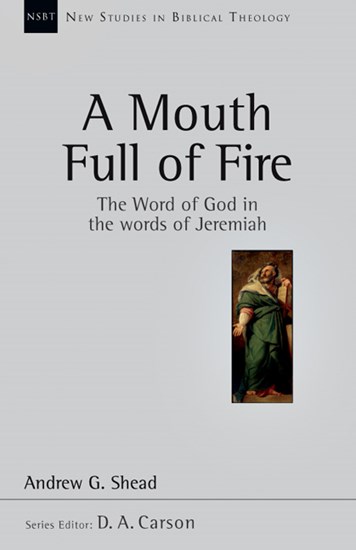
|
A Mouth Full of Fire
paperback
|
- Length: 328 pages
- Dimensions: 5.5 × 8.5 in
- Published: October 04, 2012
- Imprint: IVP Academic
- Item Code: 2630
- ISBN: 9780830826308
-
Other Retailers:
Amazon*
*affiliate partner
-
ebook
"I am putting my words as a fire in your mouth; these people are tinder and it will consume them." (Jeremiah 5:14)
In the book of Jeremiah, not only is the vocabulary of "word" and "words" uniquely prevalent, but formulae marking divine speech also play an unprecedented role in giving the book's final form its narrative and theological shape. Indeed, "the word of the Lord" is arguably the main character, and a theology that is both distinctive and powerful can be seen to emerge from the unfolding narrative.
In this stimulating study, Andrew Shead examines Jeremiah's use of word language; the prophet's formation as an embodiment of the word of God; his covenant preaching and the crisis it precipitates concerning the recognition of true prophecy; and, in the "oracles of hope," how the power of the word of God is finally made manifest.
Shead then brings this reading of Jeremiah to bear on some issues in contemporary theology, including the problem of divine agency and the doctrine of Scripture, and concludes by engaging Jeremiah's doctrine of the Word of God in conversation with Karl Barth. The prophet's major contribution emerges from his careful differentiation of "word" and "words."
Addressing key issues in biblical theology, the works comprising New Studies in Biblical Theology are creative attempts to help Christians better understand their Bibles. The NSBT series is edited by D. A. Carson, aiming to simultaneously instruct and to edify, to interact with current scholarship and to point the way ahead.
"It is extraordinarily rare for a reading of a biblical book to be simultaneously creative and convincing, but Dr Andrew Shead has managed it in this work on Jeremiah. It is even more extraordinary for a book that exemplifies careful exegesis and the best of one kind of biblical theology to speak authoritatively to the discipline of systematic theology, but Dr Shead's work manages that, too. Characterized by tight and disciplined writing and careful thought, this volume deserves careful study. You will never again read Jeremiah exactly the same way you have read it in the past."
"This is a very significant book for the study of Jeremiah specifically, as well as for its contributions to biblical theology and the doctrine of Scripture."
"Shead's book is an important contribution to the theological interpretation of the Bible. Those in the evangelical and confessional wings of the church will especially appreciate this illuminating engagement of the World of God in Jeremiah."
"I recommend A Mouth Full of Fire to any pastor, interested lay person, or scholar who desires to explore this new avenue of thought in prophetic research. Shead’s addition to this series is exceptional and deserves recognition for his work in biblical studies and biblical theology."
CONTENTS
List of figures and tables
Series preface
Author's preface
Abbreviations
Introduction: an exercise in theological interpretation
Biblical theology or theological interpretation? Reading Jeremiah as a theological book
Can biblical studies admit theological readings and remain intact?
Can theology made from retold narrative still be called theology?
From theology to doctrine
1. Word and words in Jeremiah
The suitability of Jeremiah as a source for word theology
The distinctive shape of Jeremiah's word theology
First elements of a word theology
2. Structuring Jeremiah as a narrative about the word of God
Establishing the structure of Jeremiah
A narrative about the word of God
Concluding reflections
3. Word and speaker
The word of God is the speech of God
The shape of Jeremianic discourse
Jeremiah in his times
Jeremiah's call and commissioning
The voice of God in Jeremiah 2:1–6:30
The voice of the prophet in Jeremiah 14–15
Concluding reflections
4. Word and hearers
The covenant preaching of Jeremiah and the prophets
Jeremiah against the prophets
The hearers' dilemma: Jeremiah or Hananiah?
'The people' in Jeremiah's preaching
Concluding reflections
5. Word and power
The power of the word of God to transform
Overcoming the failure of the word: Jeremiah 30–31
Judgment realized, hope deferred: Jeremiah 35–44
New life out of death: Jeremiah 50–51
How does the word of God exert its power?
6. Word and permanence
Writing in Deuteronomy
Jeremiah and writing
Jeremiah 36
Two modern challenges to the 'Jeremiah 36 paradigm' of enscripturation
From oral to written: recovering a 'prophetic paradigm of inspiration'
Concluding reflections
7. From the book of Jeremiah to the doctrine of the word of God
Words and spirit in Jeremiah
The Word, the words and Jesus Christ: Jeremiah in conversation with Karl Barth
Theologies of the words and word of God
Jeremiah's doctrine of the Word of God
People of the Word
Bibliography
Index of authors
Index of Scripture references













